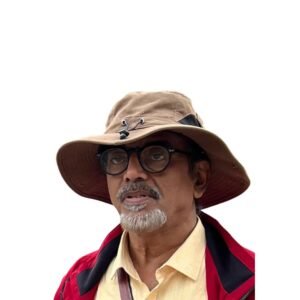Prof. Malay Mukhopadhyay : IAGR Conference 2024
Short Biography
Prof. Malay Mukhopadhyay is a distinguished retired professor from the Department of Geography at Visva-Bharati University, Santiniketan. He completed his M.A. in Geography in 1977 and earned his Ph.D. in 1985. Prof. Mukhopadhyay has had a prolific career spanning decades, with a focus on Tribal Development Planning and River Environment. He has supervised 19 Ph.D. scholars and contributed significantly to various fields of Geography.
Prof. Mukhopadhyay has delivered lectures worldwide, including in countries like Canada, the USA, China, Thailand, and the UK. He is an accomplished author, having written over 30 books covering a wide range of topics in Geography and Literature. Some of his notable works include Advanced River Geography, Geography Behind Myth: The Tale of Noah’s Deluge, and the novel Tales within a River, which has been translated into English and performed on stage.
In addition to his academic work, Prof. Mukhopadhyay has been actively involved in philanthropic activities and cultural preservation. He founded ALAP (Appreciation of Local Aesthetic Perception), a cultural organization for the Santhal Tribe in the Illam Bazar Chowpahari Forest Area of Birbhum. He is also a passionate Phillumenist, boasting a collection of over 3,000 matchboxes from around the world.
Prof. Mukhopadhyay’s contributions to Geography and his engagement with indigenous communities have left a lasting impact, making him a respected figure in both academic and cultural circles.
Title:
An overview on Sustainable Resource Management
Abstract
Recent trend of knowledge system is very progressive which has even altered the definition of resource. Recent scientific ideas have expanded the horizon of resource utilization of our earth’s resources. It is evident from history that ‘Economic Man’ with his unscientific approach has always over utilized natural resources. This injudicious approach has always led to resource exploitation. To cope with this emergent issue countries came up with several international treaties for sustainable resource allocation and management. This paper focuses mainly on two such international treaties. In 1961 a treaty was fixed in which no resource of Antarctica could be used by any countries. This has been taken up to maintain global resource balance. SCAR (Scientific committee on Scientific Research) has been constituted which proposed Antarctica as a ‘Continent of Science’ and would be opened up only for research purposes. On the other hand, the second treaty as discussed in this paper is on Arctic Ocean. In 1982, through an international treaty named UNCLOS (United Nations Convention on Law of the Seas) some negotiations got scheduled on countries sharing the Arctic Ocean coast. These international treaties on sustainable resource management are really applaudable. But it is seen that these clauses are violated in reality which is a matter of utter concern. It is the increasing human demands which are to be blamed for these alarming global issues. Earth system dynamics is isostatic; hence balance is to be maintained in both the poles. Any discrepancy in the North Pole would be a threat to the South Pole and vice versa.
Keywords: Sustainable Resource Management, International Treaties, Antarctica Treaty, UNCLOS (United Nations Convention on Law of the Seas)




